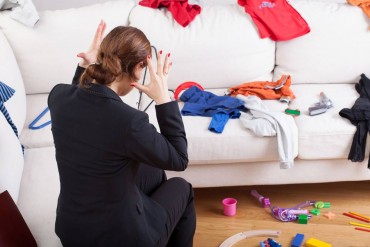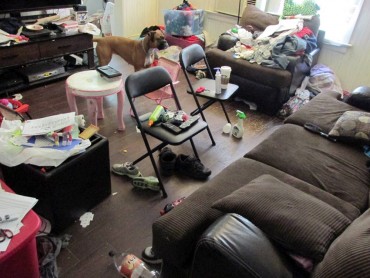 The more stuff you have, the more stress you have, period. This is true not only for those on television shows who need teams of people to dig them out of piles of their accumulated personal effects, but for all of us. This applies to everything you own beyond the basic necessities of life.
The more stuff you have, the more stress you have, period. This is true not only for those on television shows who need teams of people to dig them out of piles of their accumulated personal effects, but for all of us. This applies to everything you own beyond the basic necessities of life.
Look around you. Every item you see cost you money at some point and needs to be cleaned, taken out, put away, mended or have its batteries replaced. The list goes on and on. Not to mention the concept of how much it is costing you to store it.
This seemingly intangible cost is made instantly real if you calculate how much you are paying for every square foot of your home and then figure out what percent of your home you are using to store stuff — ouch.
Believe it or not, your stuff can also be noisy. When a space is too cluttered, it creates a kind of “visual noise” that is stressful and distracting to most people, which is why many feel the need to clean off their desk before starting a big project.
Although getting organized isn’t easy, it is simple. You really need less stuff. Here are some good questions to ask yourself about your stuff to get you started.
What percentage of my stuff isn’t my stuff?
Are you using your home as free storage for your grown-up children who have their own houses full of stuff? Are you holding on to stuff from your parents because you don’t know what to do with it, or in case your kids might want it someday?
Your home is precious. It is for you, your family and your pets to live in and enjoy. Get other people’s stuff out of your space so that you can start to focus on your own.
 Has my stuff outgrown my home?
Has my stuff outgrown my home?
If your stuff is spilling out into your garage, onto your porch or to storage sheds, you may have a problem with too much stuff. Rented storage units are expensive and almost always holding things you don’t really use. Save yourself thousands of dollars and clear that unit out first.
Am I having a hard time finding my stuff?
There are many reasons people might be loosing their stuff. Usually it is because they have too much of it. Executive dysfunction and memory problems due to ADHD, traumatic brain injury, chemotherapy etc. might also be contributing factors.
Losing your keys, phone or wallet is extremely stressful and has a big impact on your daily quality of life. A professional organizer can be very helpful in creating systems to help you put your most important stuff in the same place every time. Something as simple as adding hooks next to the front door to hang your keys on can make a big difference.
How much time do I spend thinking about my stuff?
Physical clutter can sometimes become mental clutter. This is related to the visual noise concept mentioned earlier. Most (but not all) people feel calmer in more open, spacious surroundings.
The stuff in your visual field is constantly stimulating you to action and it can be helpful to create zones in your house (the bedroom for starters) with clear surfaces and minimal décor.
Do I live with someone who has a problem with their stuff?
Maybe your stuff is completely under control, but someone else’s messy room is keeping you up at night. This one is really tricky. If this is the case, a great resource is the book “Digging Out: Helping Your Loved One Manage Clutter, Hoarding and Compulsive Acquiring” by Tomkins and Hartl. The book focuses on communication strategies to find agreement about how to keep the environment safe for everyone living in it.
Who is going to want all this stuff?
The answer to this is: No one and everyone. If you are saving stuff for your kids, ask them to go through it now. Whatever is left will be gratefully accepted at your donation center of choice as long as it is not dirty, broken or stained. These people are professionals whose job is to make sure your stuff goes to the right person.
It’s a great system. The trick is not to bring home as much stuff as you dropped off!


























